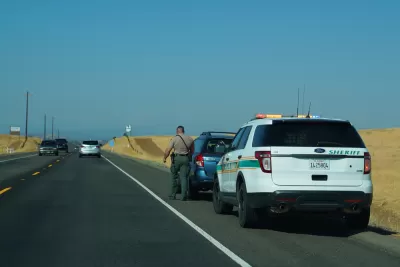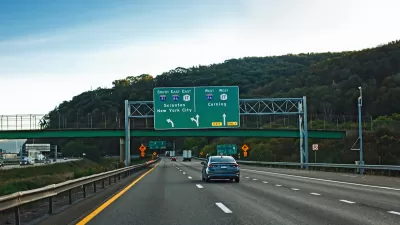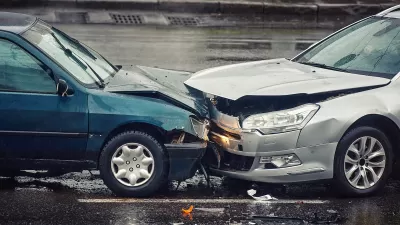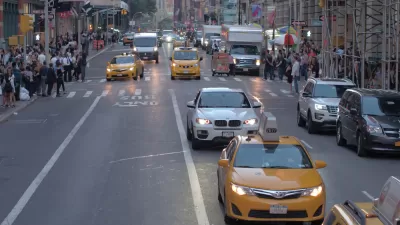A comprehensive study using data from 33 states shows no significant correlation between police stops and reduced crash rates.

Kea Wilson reports on an "explosive new study" that debunks the idea that more frequent traffic stops lead to fewer car crashes. An analysis of over 150 million traffic stops in 33 states "showed that, in the aggregate, there was no significant correlation between high rates of police stops per mile and a low crash rate per mile, or between a high crash rate and a low policing rate."
"Too often, people defend current police traffic practices based on supposed ‘evidence’ of effectiveness, but these are often small-scale analyses that do not show lasting effect of improved traffic safety," said Leah Shahum, founder and director of the Vision Zero Network. "This new study exposes those shortcomings and looks at national-scale data to determine that state traffic-patrol stops are not effective in improving traffic safety."
Because "Black drivers are 63 percent more likely to be stopped in traffic than white drivers, even though they drive 16 percent less" and are "also three times more likely to be killed in such an encounter," advocates say "we must invest in other proven strategies that don’t potentially endanger people of color" to curb traffic deaths. The study's authors conclude that "directing scarce resources to effective strategies such as rural and urban infrastructural changes, motor-vehicle modifications with advanced lifesaving technology, community-based safety initiatives, improved access to health care, or prioritizing trauma system and improved trauma care is imperative."
FULL STORY: STUDY: Police Stops Don’t Stop Car Crashes

Alabama: Trump Terminates Settlements for Black Communities Harmed By Raw Sewage
Trump deemed the landmark civil rights agreement “illegal DEI and environmental justice policy.”

Planetizen Federal Action Tracker
A weekly monitor of how Trump’s orders and actions are impacting planners and planning in America.

The 120 Year Old Tiny Home Villages That Sheltered San Francisco’s Earthquake Refugees
More than a century ago, San Francisco mobilized to house thousands of residents displaced by the 1906 earthquake. Could their strategy offer a model for the present?

In Both Crashes and Crime, Public Transportation is Far Safer than Driving
Contrary to popular assumptions, public transportation has far lower crash and crime rates than automobile travel. For safer communities, improve and encourage transit travel.

Report: Zoning Reforms Should Complement Nashville’s Ambitious Transit Plan
Without reform, restrictive zoning codes will limit the impact of the city’s planned transit expansion and could exclude some of the residents who depend on transit the most.

Judge Orders Release of Frozen IRA, IIJA Funding
The decision is a victory for environmental groups who charged that freezing funds for critical infrastructure and disaster response programs caused “real and irreparable harm” to communities.
Urban Design for Planners 1: Software Tools
This six-course series explores essential urban design concepts using open source software and equips planners with the tools they need to participate fully in the urban design process.
Planning for Universal Design
Learn the tools for implementing Universal Design in planning regulations.
Clanton & Associates, Inc.
Jessamine County Fiscal Court
Institute for Housing and Urban Development Studies (IHS)
City of Grandview
Harvard GSD Executive Education
Toledo-Lucas County Plan Commissions
Salt Lake City
NYU Wagner Graduate School of Public Service





























